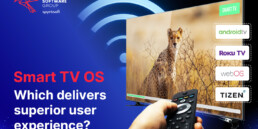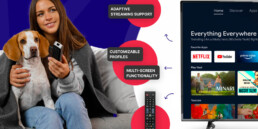The introduction of Titan OS, a novel operating system designed to improve the viewing experience and integrate the entire TV ecosystem, is causing a stir in the smart TV market. But the question remains: will it succeed in overshadowing entrenched competitors such as Android TV and WebOS? Here’s what we’ve gathered so far.
Who is behind Titan OS?
Philips unexpectedly announced that it will move away from Google TV for its some lower-end TV models in 2024. The company will adopt Titan OS for its entry-level OLED TVs as well as the Mini LED and LCD models launched this year.
Developed by Titan OS S.L., a Spanish technology, entertainment and advertising company, Titan OS focuses specifically on smart TVs. They’ve already secured a strategic partnership with TP Vision, the company behind Philips and AOC TVs, ensuring a presence in Europe and Latin America. In addition to its headquarters in Barcelona, Titan will expand its global presence with additional offices in Amsterdam and Taipei.
What does Titan OS offer?
Let’s delve deeper into the specific features that define Titan OS:
Personalized user experience
The system emphasizes user profiles and preferences, creating a tailored home screen with intuitive navigation and relevant content recommendations. This approach echoes Android TV’s profiles but aims for a more focused and intuitive experience.
Content aggregation
Similar to platforms like Apple TV or Roku, Titan OS intends to aggregate content from diverse sources, including streaming services, traditional broadcasting, and online libraries. This promises simplified content discovery, but its effectiveness and user experience remain to be evaluated. An interesting and useful option will be the ability to globally search for productions of interest. By typing in the title of a movie or series, we will get information on which streaming platform it can be watched.
Independent OS and ad platform
Unlike systems with built-in ad platforms, Titan OS operates independently. This empowers broadcasters and advertisers with more control but raises concerns about user data privacy. Titan OS needs to clearly communicate its data utilization policies and provide control options for users.
Cloud-based updates
Unlike other typical systems, Titan OS relies solely on cloud-based application update mechanism. This approach not only ensures that apps are always up-to-date but also reduces the local storage requirements on the TV itself.
The operating system will provide customer access to a list of premium apps and channels on Philips branded TVs, including Disney+, Netflix, Prime Video, Youtube, Pluto TV, DAZN, and more.
What are the early impressions?
Information is still limited, but the partnership with TP Vision suggests early industry confidence. Analysts note the potential for a more open and adaptable platform compared to existing options. However, concerns remain about data privacy and competition in the already crowded smart TV market.
Is it worth waiting for Titan OS?
It is too early to say definitively. While the focus on personalization and content discovery sounds promising, the success will depend on execution. Titan OS aims to target the 40% of the TV market lacking proprietary operating systems by offering an independent operating solution.
If you are looking for a fresh TV experience, Titan OS might be worth considering. But for now, keep an informed eye on its development and wait for user reviews before making a decision.
If you find this article valuable, you can share it on social media →
Read more about the VOD & OTT Industry!
January 30, 2024
Smart TV operating systems: which offers the best user experience?
Discover the best Smart TV operating systems in our expert analysis. Compare top platforms, focusing on user experience.
November 23, 2023
7 Smart TV Features for a Seamless Streaming Experience
Discover emerging opportunities in the Smart TV market. Find out how service providers can leverage enhanced Smart TV features to stay ahead.
December 15, 2022
Smart TV, Roku and Chromecast Explained
Ever wondered what's the difference between Smart TV, Roku, and Chromecast? We've got you covered!
Are you looking for a partner to build a Video Solution?
Leave your email and a short description about your project. We would gladly discuss different cooperation possibilities!





